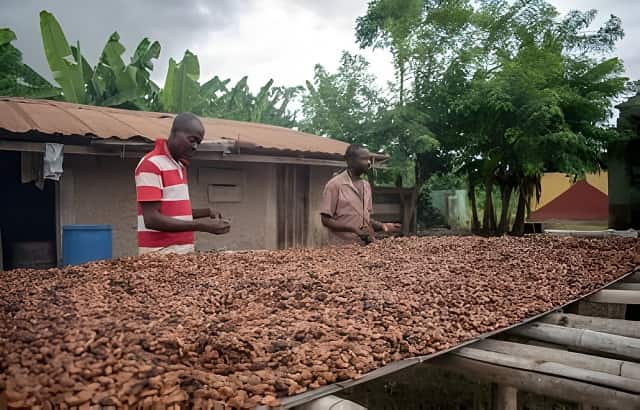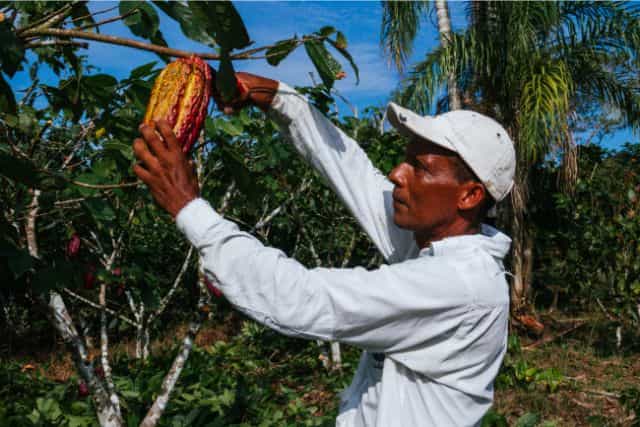Cocoa Farmers in Ghana lament low earnings amid high prices

Cocoa Farmers in Ghana lament low earnings amid high prices
Despite the surge in global cocoa prices to an all-time high in April, farmers in Ghana are finding it difficult to cover their expenses. Many cocoa farmers feel frustrated and despairing due to the government’s implementation of the local pricing system.
In the Afigya Kwabre district of Ghana’s Ashanti region, individuals like Kingsley Owusu are renowned for cultivating Ghana’s top cash crop. Owusu and his community have dedicated over three decades to growing cocoa beans.
For a long time, the cocoa harvest provided him with the means to support his children, who have all grown up now. However, at the age of 60, Owusu is concerned about his own livelihood.
“Due to climate change and diseases, my production levels have significantly declined. Additionally, illegal mining activities are exacerbating the situation,” Owusu shared with The Diplomat News, expressing his struggle to make ends meet.
Previously, Owusu used to yield around 10 bags of cocoa per season, but now he faces difficulties in even filling three bags. Consequently, he has considerably less cash on hand compared to before.
Read Also: Bank of Japan Breaks 17-Year Tradition with Interest Rate Hike
Ghana intervenes to support cocoa farmers

The Ghana Cocoa Board (COCOBOD), responsible for overseeing the industry, recently declared its intention to raise the amount it provides to cocoa farmers per ton.
COCOBOD released a statement stating that it deemed the adjustment in the cocoa producer price necessary to improve cocoa farmers’ earnings.
Previously set at 20,928 Ghanaian cedis (€1,460/$1,557) per ton, the board has committed to a nearly 60% increase, resulting in a payment of 33,120 cedis per ton for farmers going forward. This equates to 2,070 cedis per bag of cocoa weighing 64 kilograms.
However, farmers like Owusu have expressed concerns regarding the government’s new pricing strategy.
Ghana’s Cocoa Farmers: Excluded from Decision-Making

Ghana’s cocoa farmers are expressing their frustration with the lack of involvement in decision-making processes. “We should be receiving more according to the world price,” one farmer told The Diplomat News. This month, the price of cocoa on the global market reached $10,000 per ton.
Commodity futures markets in New York and London primarily determine the price of cocoa, with supply and demand playing a significant role.
However, the sale of cocoa beans varies across different countries, with African cocoa trading systems often having distinct structures.
For instance, in Ivory Coast, the leading cocoa producer in Africa, farmers have the option to sell their beans to cooperatives they belong to or directly trade with private buying companies.
In contrast, Ghana, the second-largest exporter of cocoa globally, has an established mechanism that restricts farmers in various ways. They are unable to trade with external buyers, resulting in a lack of control over their pricing.
Instead, they can only sell their beans to the state agency COCOBOD, which then trades the product on the global market.
Read Also: Macron: Mercosur-EU deal is ‘very bad’ for both sides
The reason behind Ghana’s centralized cocoa market

Fiifi Boafo, the spokesperson for COCOBOD, mentioned to The Diplomat News that even though cocoa prices rise in the global market, it doesn’t directly impact the income of farmers.
“We are thrilled when prices go up in the international market because it means more income for farmers,” he said. Boafo also mentioned that they engage in “forward sales” with farmers.
However, Ghana’s practice of setting cocoa sales prices in advance results in producers depending on the government’s agreed prices, without having the freedom to make their own decisions.
COCOBOD stated that the purpose of this policy is to provide a means for both the government and cocoa-producing farmers to collectively manage the supply and demand dynamics in the commodities market. Farmers do this to ensure future cocoa supplies, mitigate risks of price volatility, and ultimately stabilize the market.
Contrarily, Asiedu argues that this arrangement leaves cocoa-producing countries like Ghana in a vulnerable position when it comes to securing fair pricing for their products. He insists that there is a lack of fairness in the current system, which is why COCOBOD agrees to accept whatever price is offered.
According to Asiedu, local farmers in Ghana deserve to receive more than just a small fraction of the price at which their beans are sold. He blames government involvement in the production process for exploiting producers and not considering the true value of their cocoa.
Boafo acknowledges that this policy of forward selling Ghana’s cocoa may not always provide farmers with the opportunity to fully benefit from their output, especially when global prices are high. However, he also recognizes that Ghana’s policy has its advantages, as it has historically protected farmers by establishing reliable rates for their crops.
Are farmers facing an insurmountable market?

Farmers are currently grappling with an uncontrollable market situation. As per Asiedu from the West African Cocoa Farmers Organization, Ghana is facing a critical situation where the cocoa sector might be on the brink of collapse. A significant number of farmers are either giving up on their farms or retiring without successors to take over.
The majority of farmers, approximately 70%, are elderly and lack the physical strength to maintain their farms, especially when they are not adequately compensated for their hard work. Consequently, they end up abandoning their farms, as explained by Asiedu.
In an attempt to address this issue, both Ivory Coast and Ghana implemented a unique strategy in 2019 to enhance the living standards of farmers. They mandated cocoa buyers to pay an extra premium of $400 per metric ton of cocoa beans purchased, known as the living income differential, to counterbalance the changing and aging cocoa labor force.
However, a recent study by Oxfam, a humanitarian organization, presented at the World Cocoa Conference indicates that this initiative has not been successful, partly due to the escalating commodity prices.
The policy also faced challenges because traders already pay a negotiated premium for cocoa based on factors like taste, fat content, or bean size, referred to as the “country differential.”
Boafo, speaking to The Diplomat News, highlighted the importance of setting a price on the global market that ensures farmers can sustain their production while also being affordable for buyers. Unfortunately, the current market conditions do not favor cocoa farmers, making it challenging to ensure the industry’s sustainability.
Oxfam’s research additionally uncovers that cocoa purchasers diminished the disparities between Ivory Coast and Ghana after the implementation of the $400 bonus to aid farmers, intensifying the circumstances.
Is chocolate becoming scarce?

Meanwhile, there is another significant crisis emerging in the cocoa industry in the leading producer countries. Over the past few years, there has been a drastic decline in cocoa production levels.
Between 2021 and 2022, Ghana produced approximately 750,000 metric tons of cocoa beans. However, production has significantly dropped since then. It is now projected that Ghana’s cocoa output for the season between 2023 and 2024 will decrease by nearly 40%.
According to Boafo, this shortage of cocoa beans has led to recent prices exceeding $10,000 per ton in the global market.
Asiedu explained that apart from not receiving fair prices for cocoa beans, the sector is also facing serious threats from climate change and other factors.
“We are now experiencing unusual rainfall, excessive sunshine, and these conditions are unpredictable. Additionally, we are dealing with various issues such as diseases that farmers need to control,” he told The Diplomat News.
Boafo emphasized the need to adopt smart farming methods to protect the sector and combat global warming. “Climate change is a major concern,” he stated. “It is crucial that we address its effects.”
However, whether the challenges stem from climate change, commodity prices, pests, production rates, or incentives to sustain the cocoa trade, it appears that the countries producing these valuable beans have limited influence over the final price outcome.
It seems that the power to determine prices lies predominantly with chocolate buyers and their intermediaries.









